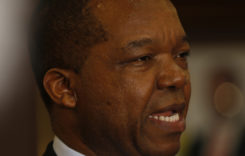By Lifaqane Nare
ONE of the big questions that Zimbabwe is facing as it commemorates Women’s Month is: Are the current national laws adequate in protecting women in perennial battles over inheritance?
A highly publicised case, which is still unfolding, involves Elizabeth Macheka, the widow of Zimbabwe’s former Prime Minister, Mr Morgan Tsvangirai.
While it is likely to play out in the public eye due to the nature of the personalities involved, it gives an insight into the many private battles fought by ordinary women over inheritance.
What is the obligation arising from marriage?
Standard marriage vows between partners speak to life together until death. There is nothing in these vows committing a deceased spouse to taking care of the surviving one beyond the grave. While some do prepare wills for that eventuality, most surviving spouses especially women, usually find themselves at the mercy of relatives or in this age, at least at the mercy of the law.
What does the marriage and inheritance law say?

Zimbabwe High Court Photo credit: amanderson2, Flickr http://flic.kr/p/JHz4AE
Marriage and inheritance
For purposes of inheritance, Zimbabwean law recognises civil, customary and unregistered customary marriages. All customary marriages whether registered or unregistered are valid for the purpose of inheritance except in situations where a person contracts a registered or unregistered customary law marriage when he is already married to someone else under the Marriage Act (Chapter 5:11). In that case, the customary union is invalid. In a mixed marriage where a woman marries under Chapter 5:11 a man who is already married under customary law to someone else, then the last marriage will be treated as a customary law marriage for purposes of inheritance(www.kubatana.net).
Where does the matrimonial home stand?
The matrimonial home refers to the house or domestic premises in which the spouses or the surviving spouse lived in immediately before the person’s death. This goes to the surving spouse (or spouses) where the deceased died partly or wholly intestate (without a will), if such house or premises form part of the deceased person’s estate.
The spouse of the deceased is also entitled to the household goods and effects, a share in the joint estate as well as a further share in the free residue of the estate.
How is the polygamist’s estate managed?
If the deceased is survived by more than one wife, and had more than one child, a third of his net estate is shared among the wives with the first getting two shares and the rest sharing equally the remainder. In cases where the wives live in different houses owned by the deceased at the time of his death, each gets ownership of that house and the household goods therein. If ownership of that house is not possible, the wife gets usufruct – the right to enjoy the use and advantages of another’s property short of the destruction or waste of its substance. If they lived in one house, they all retain the use of that house.
The courts have ruled that wills cannot contain provisions that seek to disinherit spouses from their legal entitlements to matrimonial property. There are however, differing views with the Wakapila v Matongo ruling HH/71/08 advocating complete testation where a husband with exclusive title to the house, being able to bequeth it to a third party.
However, in the Chiminya v Chiminya case HH/272/15, the ruling was that a surviving spouse can challenge being disinherited even if the deceased husband’s property was exclusively registered in his name.
Where do children come in?
All children of the deceased are entitled to an equal share each from the residue of the estate after the spouse has been given her entitlements, regardless of the status of their parents’ relationship.
Section 56(3) of the Constitution outlaws discrimination of children born out of wedlock: “Every person has the right not to be treated in an unfairly discriminatory manner on such grounds as their nationality, colour, tribe, place of birth, ethnic or social origin, language, class, religious belief, political affiliation, opinion, custom, culture, sex, gender, marital status, age, pregnancy, disability or economic or social status or whether they were born in or out of wedlock.’’ A child in Zimbabwe can not be deprived of rights or discriminated against on the basis of whether their parents were married or not. In the case of minor children, death does not absolve the parent of their responsibilities. Minor children are to be maintained from the late parent’s estate until they reach majority age.
A 2015 High Court judgement made a landmark ruling to the effect that children born out of wedlock have equal status with children born in wedlock and are, therefore, entitled to an equal share of their deceased parents’ estate.
This was confirmed in a 2018 Supreme Court sitting in the case of former Masvingo Mayor Alderman Thomas Zawaira, which ruled in favour of his 10 children born out of wedlock after the High Court had barred the 10 from inheriting in favour of the 6 children born in wedlock.
Under customary law, the heir is only entitled to inherit the name, intonga/tsvimbo or any traditional items of the deceased which under customary law should pass on to the heir.
Conclusion: While one may trust their beloved to protect their interests even after death, human beings being fickle, may decide to strike from beyond the grave with a will disinheriting a spouse. In that case, the law might ensure that the ‘for better’ part of the vows triumph.
About the author: Lifaqane Nare is a Researcher at ZimFact
Do you want to use our content? Click Here











